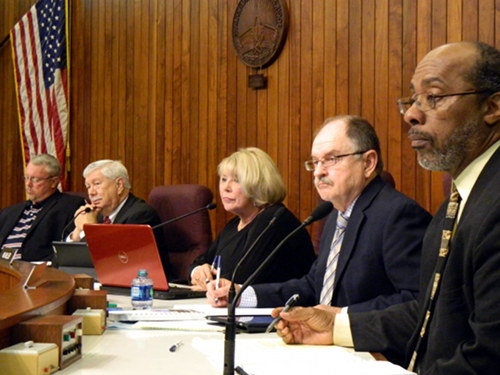
The Oak Ridge City Council on Monday again said “no” to a property tax rate increase to give more money to Oak Ridge Schools. Council is pictured above during a June 9 budget meeting.
Note: This story was last updated at 11:15 a.m. June 17.
Two last-minute attempts to pass smaller-than-requested tax increases for the Oak Ridge Schools failed on Monday, and the City Council voted 4-2 to approve a budget that does not raise taxes in the fiscal year that starts July 1.
The decision to not raise taxes for the seventh year in a row came after a parade of residents in two meetings this month asked Council to fully fund the schools. Many said they moved here because of the schools, and they said the educational system is Oak Ridge’s primary asset. School teachers, administrators, and school board members also said they support a greater investment in the schools.
“Flatline budgets will eventually produce flatline results,” said Steve Reddick, an eighth-grade social studies teacher at Jefferson Middle School and co-president of the Oak Ridge Education Association.
The schools had requested $17.9 million from the city, but the no-tax-increase budget lowered that amount to $14.6 million. School officials had previously said they will have to “go back to the drawing board” and make cuts if Council did not approve the tax rate increase. It’s not clear yet what cuts might be made. The Oak Ridge Board of Education could discuss changes to the school system’s budget, which was approved in May, during a Monday evening meeting.
Some speakers in the two City Council budget meetings this month objected to the requested tax increase, with some saying they couldn’t afford it and others saying it might discourage residents or businesses from moving here. They argued that the economy is in bad shape, and the city has a lot of debt—much of it for the renovated Oak Ridge High School—and has had recent increases in water and sewer rates.
“Right now, this city cannot afford more costs for property tax owners,” City Council member Anne Garcia Garland said. “We have a school system that is exceptionally well-funded.”
“Where are we going to get the money from?” asked resident Walter Zobel, who has been in Oak Ridge since 1954. He said his pension has not increased and his Social Security has only gone up by 1.2 percent.
Others said they supported a technology initiative known as 1:1 that would eventually provide an electronic learning device, possibly a Microsoft Surface tablet computer, to every student—but not a tax increase to pay for it.
The Oak Ridge Board of Education passed a budget in May that requested a 37-cent property tax increase to start rolling out the 1:1 initiative, hire technology personnel and other staff, comply with the reporting requirements of the federal Affordable Care Act, and give employees a 2 percent pay raise, among other things.
Meanwhile, the city staff had recommended a municipal budget that did not include a tax rate increase. That budget was based on input from Council, and it includes a 2 percent pay raise for city workers. It also includes the city’s annual transfer to the schools.
The City Council on Monday rejected separate proposals from Council members Chuck Hope and Charlie Hensley to raise the property tax rate by either 12 cents or 10 cents to give more money to the schools. Both proposals failed in 2-4 votes, with only Hope and Hensley voting “yes.”
“Our schools have been, and continue to be, one of the biggest attributes,” Hope said. “If we continue to tighten the shoestrings or belt, something will break.”
Hope and Hensley cast the two votes against the budget that did not include the tax rate increase. Council member Trina Baughn was absent.
Reddick said the funding from the city to the schools has fallen over the years from 40 percent to 28 percent. Meanwhile, school system costs have risen and new requirements have been imposed by state and federal mandates, he said.
Monday’s vote was the second and final reading of the budget. The City Council approved the budget on first reading on June 9. They did not consider any tax rate increases during that meeting.
The tax rate is now $2.39 per $100 of assessed value. The 37-cent tax rate increase would have raised it to $2.76 and could have cost the owner of a $200,000 home another $15 per month.
More information will be added as it becomes available.









Dave Smith says
Wallis Simpson once remarked that “You can never be too rich or too thin.†In Tennessee we’re not doing so well on either of those benchmarks, thus we’ve copped another more achievable–and more insidious–one: “You can never pay too little tax.” In Oak Ridge we’re beginning to get the hang of that. We’ve had six unbroken years of no increase in the property tax AND BUSINESS IS REALLY BOOMING as a result. Just ask anybody.
Philip W Nipper says
I concur with Charlie Hensley that the Budget and Finance Committee needs to be resurrected. The hope would be that budget discussions would begin much earlier in the year than they do currently with the goal of having more of a solid budget plan / recommendation on the table while ending much of the drama that we have been subjected to recently. Not sure of the makeup of the former committee but if it comes back I think it should be turned into a citizen board with a couple of council persons and a couple of BOE persons / ORS personnel combined with some citizens at large with other city staff as needed. To me the current way of devising the budget is broken and is in need of some serious remodeling.
David Allred says
I am probably like most Americans in that I don’t really know how to feel. It’s hard to say no to more money for education. We all want to believe that by tossing another $500 or $1000 per pupil that somehow all our little Johnny’s and Jane’s will become international scholars. Spending on education is up 200% since I was I school. The average number of employees has doubled. Since No Child Left Behind passed in 2001, student populations in TN have risen by 8%, the number of teachers by 18%, and the number of administrators by 33%.
Districts have needed to hire more top end administrators to cover the paperwork and legal demands of so-called “education reform.” The more successful a teacher becomes, the more likely they will be removed from the classroom and given and admin job because it is believed they can make the system shine, when their real talent resides in that loving care they give our children day in and day out.
Our students will spend on average 2.5% of their instructional hours taking mandated tests, less for elementary age and more for high school aged kids. They will spend another 6% of their instructional hours in test prep. The testing industry is a multi-billion dollar enterprise and that’s just counting the contract fees to testing agencies. It doesn’t include the constant text book changes, payments to scoring systems, State testing trainers and administrators, and the millions spent in technologies needed to stay atop the testing game. You might read that systems only spend an average of $30 per pupil on standardized tests, but don’t buy it. There is a mountain of money beneath the standards; it gets poured into meeting those standards, and into near monopolies established for text book printing, software, and more.
The United States leads the planet in education spending at nearly 10K per pupil. Oak Ridge is closer to 12 and half thousand. Granted the average age of the US citizen is considerably lower than say Japan which would account for much of that, but we also are quite egregious at keeping that money from actually reaching a student or a teacher’s salary.
Imagine a world in which the people profiting the most from the “education” of our children happen to be the people furthest from the classroom. Or a world in which we somehow believe a computer scan sheet is a better judge of student learning than a trained teacher’s observation. That’s the system we have in America and it is broken at its very core.
Many tax payers feel like they’re throwing money at a run down car that should have been traded in eons ago. I personally wish Oak Ridge would truly become a leader in education, not by producing better test scores, but by bucking a culture crippled by its hard and fast pursuit of data rather than genuine learning.
As I have said in many other places, today’s student has been taught exceptionally well how to answer a question… but rare is the student who can actually form one.